ServiceNow vs. Jira Service Management: Which IT Service Management (ITSM) solution delivers better performance, scalability, and flexibility? As businesses increasingly rely on robust ITSM tools to streamline operations, choosing the right software becomes paramount for efficient service delivery and overall success.
In this blog post, we’ll thoroughly compare ServiceNow vs. Jira Service Management, examining their strengths, weaknesses, and notable features.
However, if these options don't meet your specific needs, we have an alternative service desk software to introduce you to: InvGate Service Management, a potential solution that might perfectly align with your requirements.
TL:DR
- ServiceNow stands out for its continuous product enhancements and integration capabilities. However, users have also pointed out its high licensing costs, potential additional expenses, steep learning curve, and complexity for new users.
- Jira Service Management is recognized for streamlined sprint planning, efficient ticketing, and flexible pricing, yet faces challenges with complex migration, limited integrations, and reported issues with support and UI.
- InvGate Service Management comes in as a strong option, offering a streamlined configuration and setup process using a no-code/low-code approach, exceptional user experience, and a cost-effective solution without compromising functionality.
We tried to be as thorough as possible, but if you don't have enough time to read it through and through, here's (another) TL;DR: InvGate Service Management can do everything we say here, and you can test it right away for free for 30 days.
ServiceNow vs Jira: feature comparison
ServiceNow and Jira Service Management (JSM) both support IT Service Management practices, but they approach it differently. ServiceNow offers a broad enterprise suite, while Jira is more modular and leans into agile methodologies. Here's how they compare on core features:
| Feature | ServiceNow |
Jira Service Management
|
| ITIL modules | Full ITIL support out of the box |
ITIL-certified features, but more basic
|
| CMDB |
Built-in, highly detailed | Available, but less sophisticated |
| Automation |
Advanced, low-code tools (Flow Designer) | Rule-based automation + integrations |
| Self-service portal | Customizable with rich capabilities | Simplified, tied to Jira Service projects |
| Incident & Problem Management | Robust workflows, reporting, SLAs | Agile-oriented, integrated with Jira Core |
| Third-party integrations | Extensive, with large enterprise apps | Strong Atlassian ecosystem + REST API |
| DevOps alignment | Separate modules, full pipeline visibility | Strong integration with Jira/Bitbucket |
ServiceNow vs Jira: Pros and cons of each platform
Each platform fits different types of organizations. ServiceNow is suited for large enterprises needing deep customization, while Jira works well for agile teams and mid-sized companies.
| Platform | Pros | Cons |
| ServiceNow | – Rich ITSM capabilities – Scalable and customizable – Mature CMDB |
– High cost – Steep learning curve – Overkill for small teams |
| Jira Service Management | – Cost-effective – Familiar to developers – Quick setup |
– Limited CMDB – Less suited for complex workflows |
User reviews and market perception
ServiceNow is often praised for its powerful feature set, scalability, and enterprise readiness. It's viewed as a leader in the ITSM space but criticized for complexity and licensing costs.
Jira Service Management is well received for its agility, ease of use, and tight integration with developer tools. Users appreciate its simplicity but note that it lacks depth for full ITIL implementations.
-
Gartner Peer Insights:
-
ServiceNow: High satisfaction, especially in large enterprises.
-
Jira Service Management: Positive for mid-market and agile environments.
-
-
G2 Ratings:
-
ServiceNow: ~4.3/5 (strength in IT operations and customization)
-
Jira Service Management: ~4.2/5 (developer-friendly and value for cost)
-
What is ServiceNow?
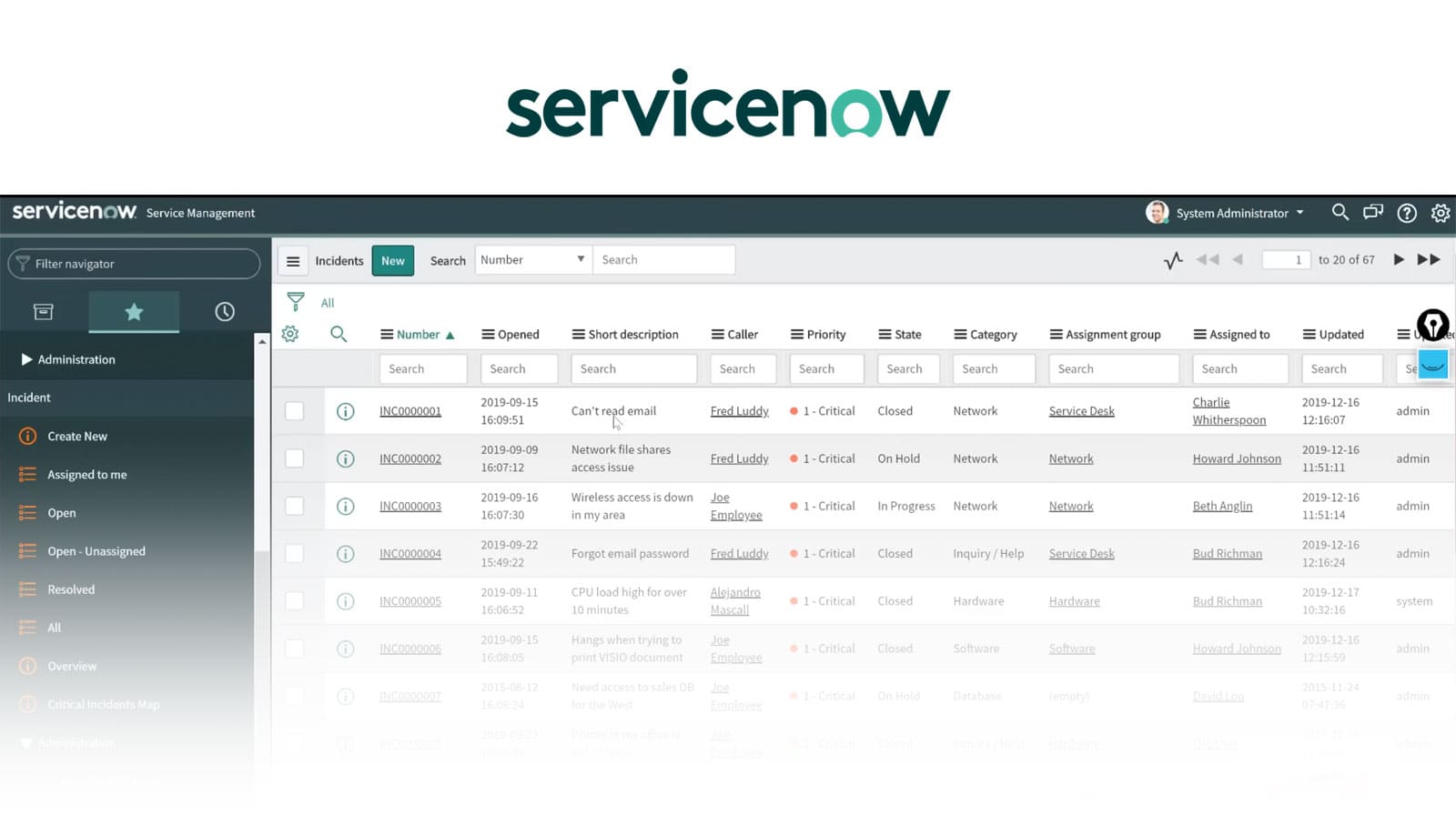
ServiceNow is a company that offers a cloud-based platform aimed at streamlining IT Service Management (ITSM) and digital workflows for organizations. Their primary goal is to simplify and automate IT operations, enhance customer experiences, and drive digital transformation for businesses.
Founded in 2004 and headquartered in Santa Clara, California, ServiceNow provides a wide range of cloud-based solutions customized to suit the diverse operational needs of enterprises. Their solutions cover various domains, including IT Service Management, IT Operations Management, IT Business Management, Customer Service Management, Human Resources Service Delivery, Security Operations, and more. They have also established strategic partnerships with well-known companies like NVIDIA and Juniper Networks, which further strengthens their presence in the market.
What users like from ServiceNow
Customers have highlighted several positive aspects of ServiceNow, as noted by reputable sources like Gartner and G2. Here are some of the benefits mentioned.
- Cloud-based platform - ServiceNow operates on a cloud-based infrastructure, allowing organizations to scale their operations, adapt to changing needs, and access the platform from any location with internet connectivity.
- Continuous product enhancements - ServiceNow consistently introduces improvements by acquiring new technologies and developing native features. Customers appreciate the company's transparent product roadmap, which provides visibility into upcoming enhancements and features.
- Expanded usage across multiple domains - ServiceNow's value extends beyond IT ITSM. Customers find value in utilizing ServiceNow for various other areas such as Human Resources (HR), Customer Engagement Center (CEC), Governance, Risk, and Compliance (GRC), and IT Operations Management (ITOM).
- Growing user community - ServiceNow has gained significant relevance in the industry and boasts a rapidly expanding community of users. Many customers discover or gain experience with the platform through recommendations from their peers.
- Integration capabilities - ServiceNow provides features that facilitate seamless integration with other systems and applications. This capability enables efficient data exchange and workflow automation, enhancing overall operational efficiency for customers.
What users don’t like from ServiceNow
While ServiceNow possesses numerous strengths and positive attributes, customers have also expressed their concerns and dislikes about certain aspects of the platform. Based on analysis from reputable sources like Gartner and G2, here are some of the dislikes mentioned.
- High licensing costs and potential additional expenses - ServiceNow's extensive functionality and advanced features come at a price. Licensing fees can be substantial, particularly for organizations that require capabilities beyond ITSM. Moreover, additional costs for customizations or specialized modules may result in a high overall cost of ownership.
- Steep learning curve and complexity for new users - Some users find that ServiceNow's platform has a steep learning curve, especially when utilizing its more advanced features. The system's complexity may necessitate additional training and resources to ensure users can fully leverage the tool's capabilities.
- Challenges in customizing workflows and processes - The platform may have limitations in flexibility and customization options, making it challenging for organizations to tailor the system to their specific needs and unique business processes.
- Renewal leverage concerns - ServiceNow's dominance in the market can impact customers' ability to negotiate contracts and renewals without jeopardizing their existing discounts or concessions.
- Difficulties and delays during implementation - Organizations may encounter issues during the platform's configuration, data migration, or integration with existing systems, resulting in longer implementation timelines and potential frustrations.
- Mixed feedback on customer support - Some users have reported concerns about response times and accessibility when seeking support from ServiceNow, indicating inconsistencies in customer support.
- Limited presence in emerging markets - ServiceNow has a constrained presence in certain emerging markets, with fewer local offices and a lack of hosting options in regions like the Middle East. This can limit accessibility and support for organizations operating in those areas.
ServiceNow vs. Jira Service Management: Where does ServiceNow win?
- Comprehensive platform for enterprise operations - ServiceNow positions itself as a tool that goes beyond ITSM and offers an extensive range of solutions tailored to meet the diverse needs of enterprise operations.
- Extensive native AI capabilities - ServiceNow has native AI capabilities deeply integrated into the platform, offering users a seamless and unified experience.
- Strong market presence and partnerships - ServiceNow has a established market presence and strategic partnerships with renowned companies like NVIDIA and Juniper Networks. These partnerships contribute to ServiceNow's credibility and influence and result in collaborative innovations and integrations that benefit customers.
What is Jira Service Management?
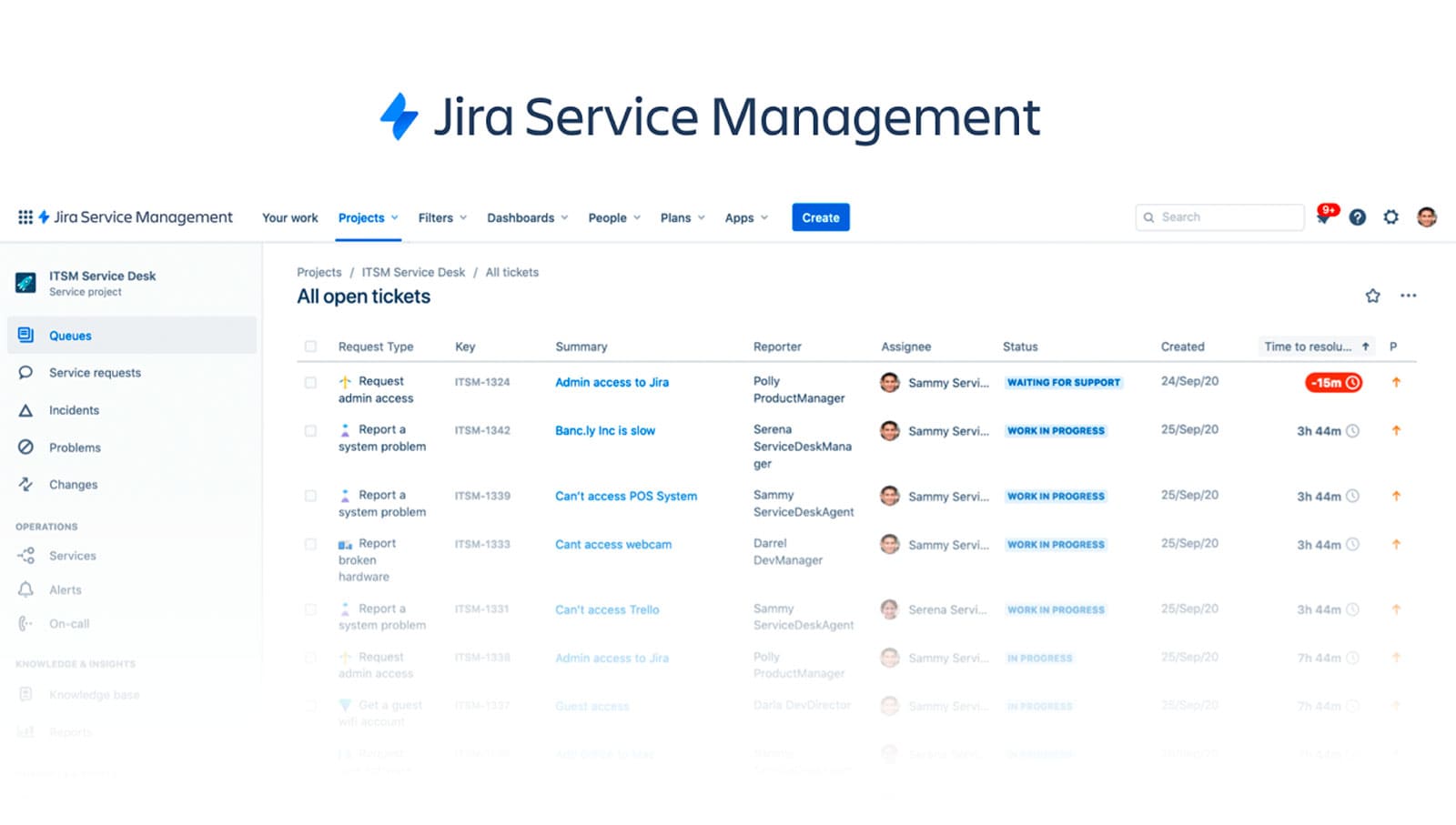
Atlassian is a global technology company established in 2002 by Mike Cannon-Brookes and Scott Farquhar in Sydney, Australia. Over the years, the company has experienced significant growth and now has offices in multiple countries, including the United States, Netherlands, Japan, and the Philippines.
With a focus on serving software developers and project managers, Atlassian offers a diverse range of products. Their portfolio includes popular tools such as Jira, Confluence, Bitbucket, and Trello. These tools serve various purposes: Project Management, issue tracking, content collaboration, code management, and team collaboration.
One standout product from Atlassian's lineup is Jira, which holds a prominent position as an IT ITSM solution. Jira Service Management provides organizations with a comprehensive platform to streamline their service desk operations. It offers features that automate workflows and efficiently manage incidents, problems, and organizational changes.
What users like from Jira Service Management
Customers have highlighted numerous positive aspects of Jira Service Management, as identified through analysis from reputable sources such as Gartner and G2. Here are some of the benefits that have been mentioned.
- Streamlined sprint planning and task assignment - Jira Service Management facilitates easy sprint planning and task assignment. It integrates smoothly with collaboration platforms like Slack and Teams, while the Kanban view provides a centralized system for task management. The tagging function allows for project-specific task organization.
- Detailed task information and filtering capabilities - Users value the platform's ability to provide comprehensive details about each task, allowing for a better understanding. Additionally, the tool offers robust filtering capabilities, enabling users to search and organize tasks based on specific criteria.
- Efficient ticketing system - The platform's ticketing system and customizable workflows simplify user task management.
- User-friendly interface - Users appreciate the platform's intuitive interface, making managing incidents and requests easier.
- Affordable pricing options - Jira Service Management offers various pricing options, including a free plan for up to 3 users with 2 GB of storage. The cloud-hosted option also provides a reasonable base price, ensuring accessibility for organizations of different sizes.
What users don’t like from Jira Service Management
While Jira Service Management has many strengths and positive attributes, there are also customer concerns and dislikes regarding specific aspects of the platform. Based on an analysis conducted by reputable sources like Gartner and G2, here are some of the dislikes that have been highlighted.
- Steep learning curve - The platform's complexity may present a steep learning curve for users, requiring additional help and support to become proficient in utilizing the platform and its features.
- Need for additional plugins - Users have reported the necessity of extra plugins to access basic features and difficulties in achieving compliance with regulations like GDPR (General Data Protection Regulation).
- Lack and complexity of integrations - Users have expressed concerns about the limited availability of integrations, often requiring custom integrations. Additionally, integrating Jira Service Management with certain tools has been reported as challenging.
- Challenging migration process - Transitioning to Jira Projects can be complex and may require a separate user subscription, causing potential difficulties during the migration process.
- Difficulty working with Atlassian support - Some users have faced challenges in their interactions with Atlassian support, experiencing difficulties and delays in resolving their issues.
- Challenging task tracking and reporting - Users have encountered difficulties in tracking multiple tasks, generating reports, and creating dashboards within the platform.
Jira Service Management vs ServiceNow: Where does Jira win?
- Deep integration with software development tools - Jira Service Management is a natural choice for organizations heavily relying on software development and Project Management. As part of the Atlassian ecosystem, Jira Service Management seamlessly integrates with other popular tools like Jira Software and Bitbucket.
- Cost-effective pricing options - The platform offers flexible pricing options, including a free plan for small teams and affordable pricing tiers for organizations of different sizes.
- User-friendly interface and ease of use - The tool emphasizes its intuitive and user-friendly interface, designed to enhance user experience and ease of adoption.
- Agile and flexible approach - Jira Service Management prides itself on its agile approach and flexibility. The platform is known for supporting Agile methodologies, including Kanban and Scrum, allowing organizations to manage projects and tasks in a way that suits their unique processes.
- Strong focus on Task Management and collaboration - Jira Service Management highlights its robust task management capabilities, including streamlined sprint planning, task assignment, and tracking.
Considering InvGate Service Management as an ITSM solution alternative

When considering InvGate Service Management as a potential alternative to ServiceNow and Jira Service Management, several key points highlight the unique advantages of InvGate's products. Let's delve into the notable aspects of InvGate Service Management that deliver significant benefits.
1. Effective Ticketing and Incident Management
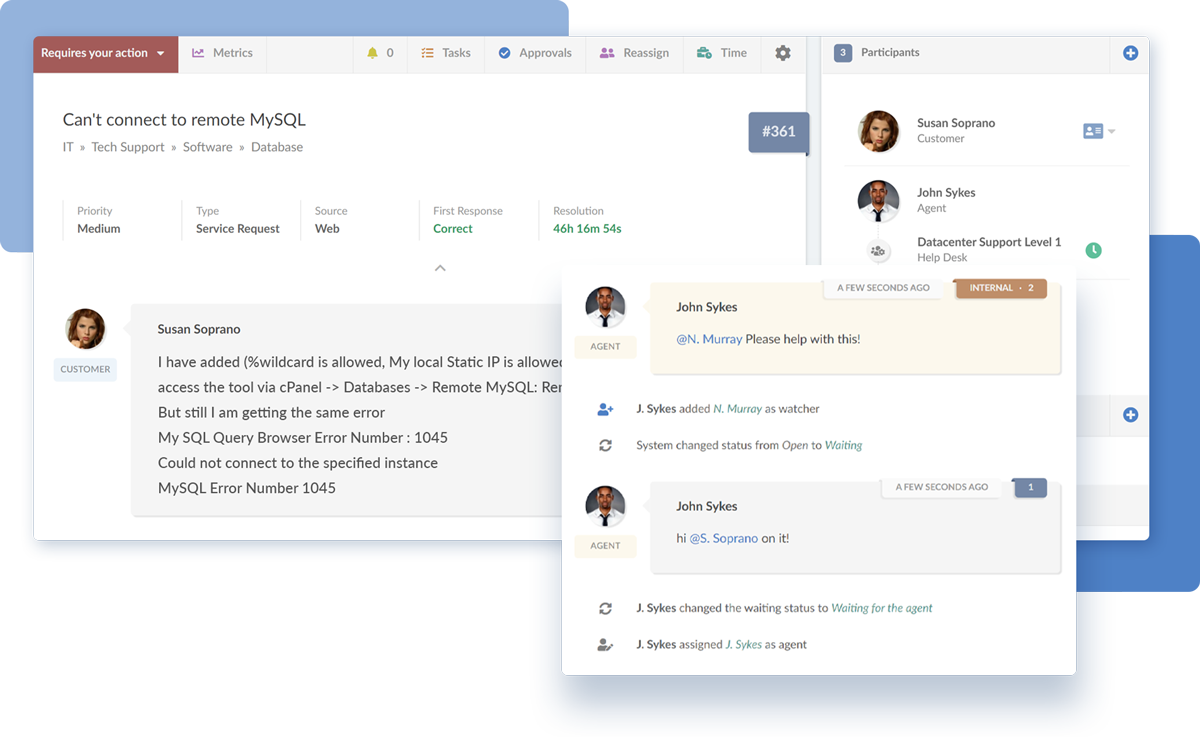
InvGate Service Management excels in providing powerful capabilities for Ticketing and Incident management. It enables efficient tracking, collaboration, and resolution of tickets, empowering IT teams to manage and prioritize incidents effectively. Advanced features like automated routing, customizable workflows, and SLA Management enhance the efficiency and effectiveness of Incident Management processes.
2. Comprehensive Asset Management
InvGate Service Management is a fit-for-purpose Service Desk solution with integrated Asset Management, allowing organizations to track and manage their IT assets throughout their lifecycle effectively. It contains features such as IT Asset Discovery, Inventory Management, Software License Management, and maintenance scheduling.
Compared to ServiceNow and Jira Service Management, InvGate Service Management offers a cost-effective solution without compromising on functionality. It provides a robust set of ITSM features and capabilities at a competitive price point, making it an appealing choice for organizations seeking a balance between affordability and functionality.
4. User-friendly and intuitive interface
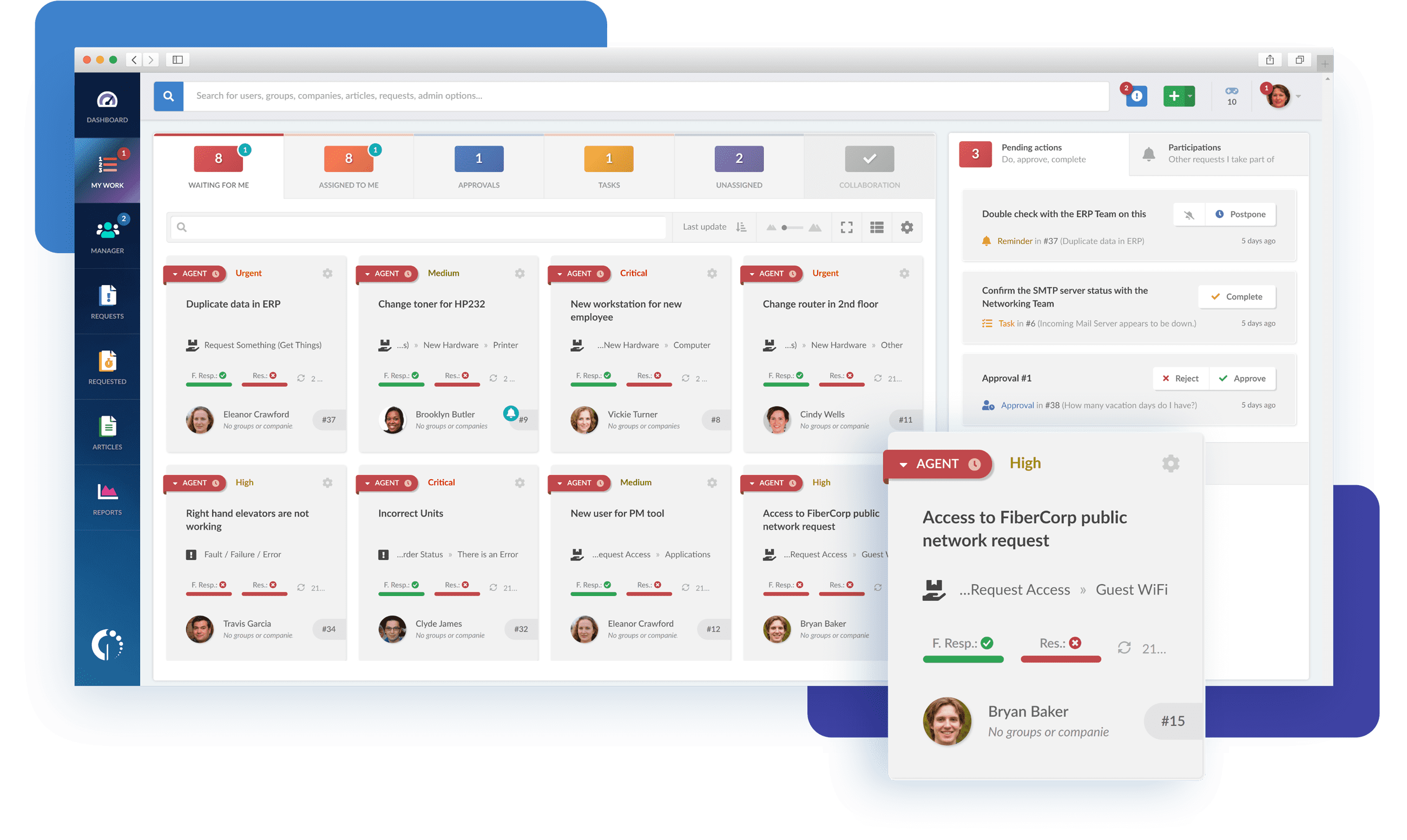
InvGate Service Management boasts an intuitive and user-friendly interface, ensuring easy navigation and utilization for IT teams and end-users. Its streamlined design and intuitive workflows create a smooth and efficient user experience, reducing the learning curve for new users.
5. Customization and flexibility
 InvGate Service Management offers extensive customization and flexibility, allowing organizations to tailor the platform to their needs and unique workflows. Administrators can easily configure and adapt the system to align with their IT processes and business requirements, resulting in a more personalized ITSM experience.
InvGate Service Management offers extensive customization and flexibility, allowing organizations to tailor the platform to their needs and unique workflows. Administrators can easily configure and adapt the system to align with their IT processes and business requirements, resulting in a more personalized ITSM experience.
6. Comprehensive reporting and analytics
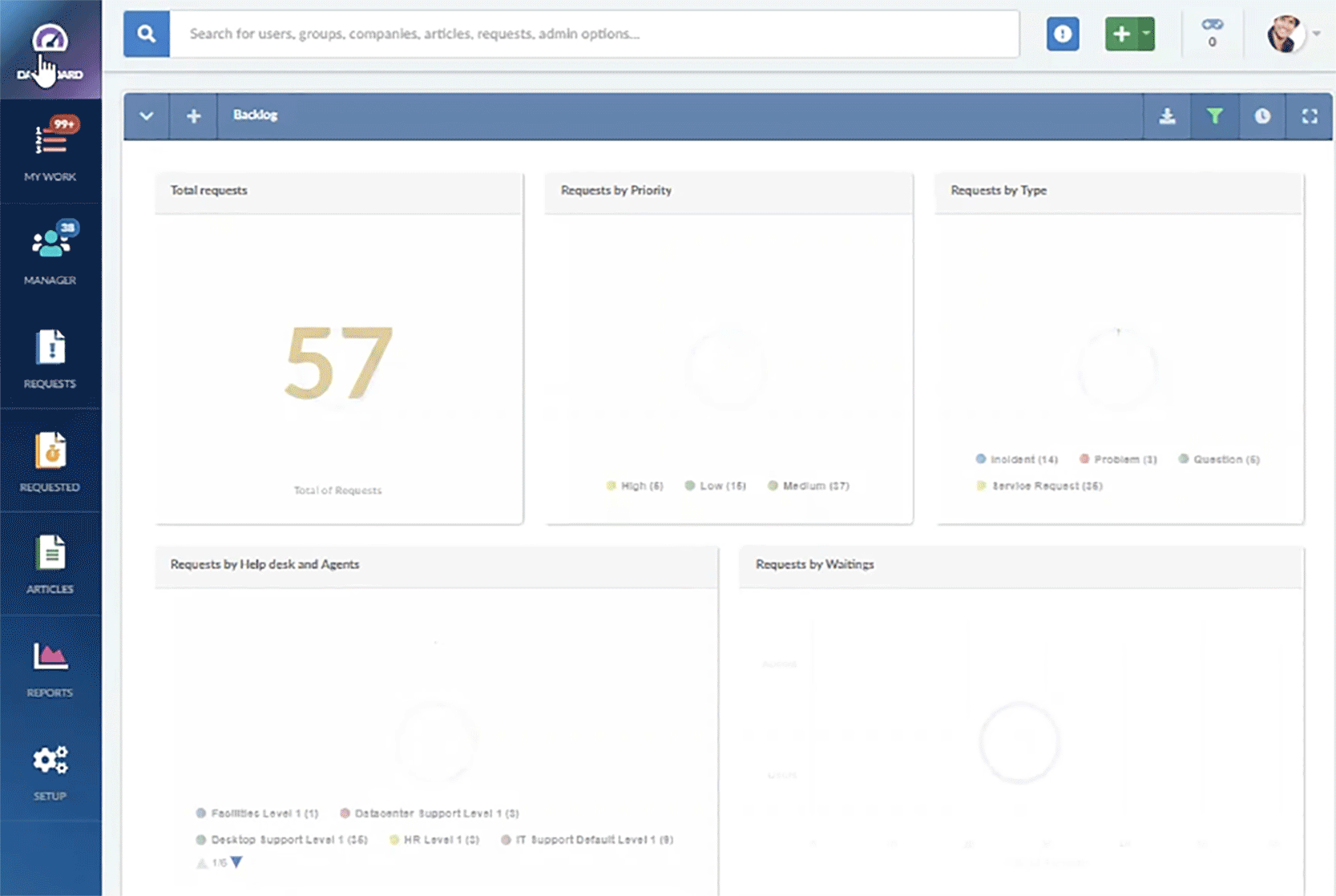
InvGate Service Management provides comprehensive reporting and analytics features, enabling organizations to gain valuable insights into their IT operations and performance. The platform offers a wide range of pre-built reports and dashboards, along with the flexibility to create custom reports. This empowers IT teams to analyze data, identify trends, and make data-driven decisions for continuous service improvement.
7. Robust self-service capabilities
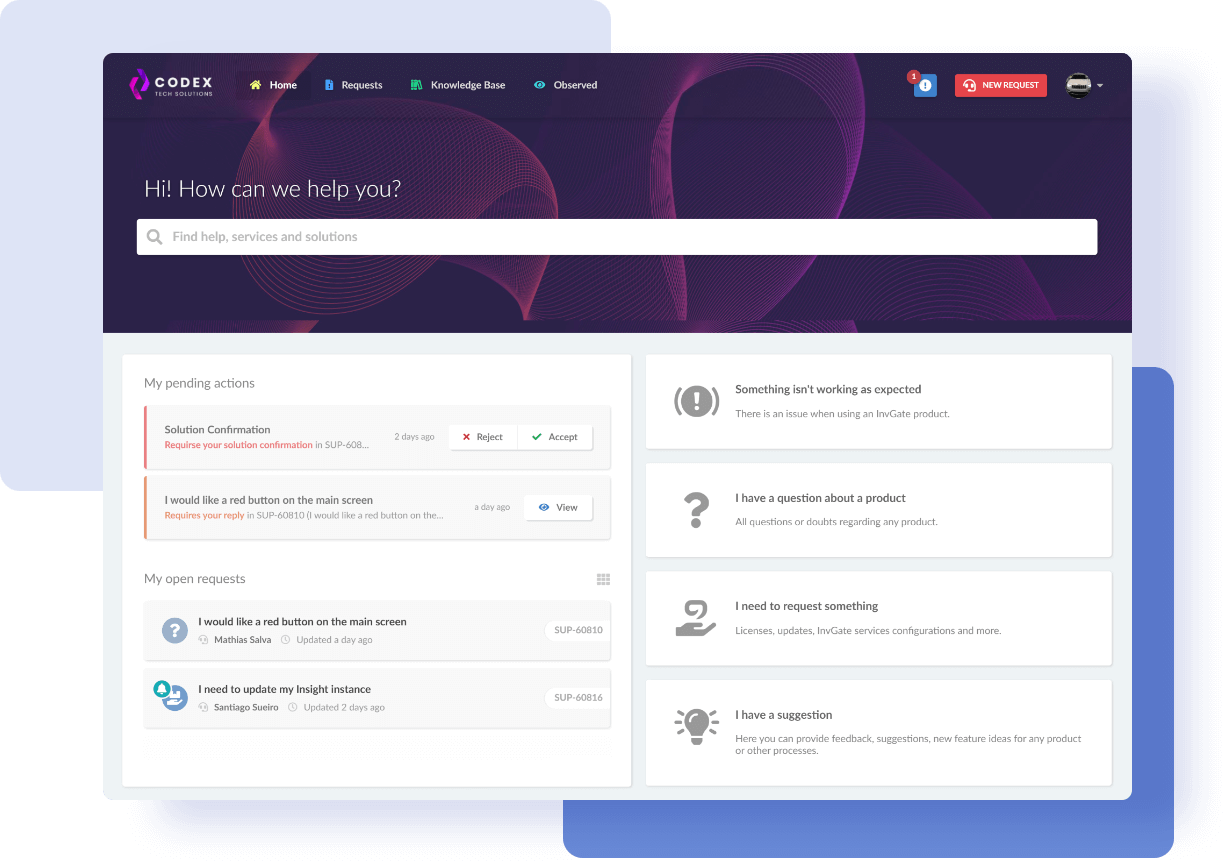
InvGate Service Management includes robust self-service capabilities, such as an easy-to-use self-service portal, an extensive IT service catalog, and a knowledge base. These features empower end-users to find answers to common issues independently, access various IT services, and leverage self-help resources. This reduces the burden on IT teams and improves overall efficiency.
8. AI-powered features
Utilizing artificial intelligence, InvGate Service Management incorporates AI-powered features like AI-Improved Responses and Support Assist. Response Suggestions leverages AI to assist agents in crafting ticket responses, saving time, and improving the quality of customer interactions. Support Assist utilizes machine learning algorithms to automate ticket categorization and routing, enhancing the efficiency of ticket management.
Next steps
Choosing the right ITSM solution is a critical decision that can significantly impact your organization's IT service delivery and overall success. By investing enough time to evaluate your options thoroughly, you will be on the right track to implementing a solution that best aligns with your needs.
To explore how InvGate Service Management can enhance your business operations, book a meeting with our experts or take a closer look at our live demo.
















